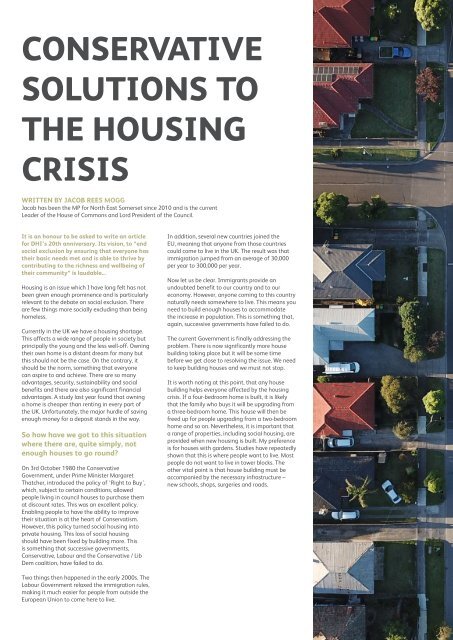The Vision Project
Throughout 2019, Developing Health & Independence (DHI), have been marking their 20th anniversary as a charity by looking to the future. Through articles, events and podcasts, they've asked people to answer the question of how we can achieve their vision of ending social exclusion. This collection of articles includes the contributions of experts from across public life and the political spectrum.
Throughout 2019, Developing Health & Independence (DHI), have been marking their 20th anniversary as a charity by looking to the future. Through articles, events and podcasts, they've asked people to answer the question of how we can achieve their vision of ending social exclusion. This collection of articles includes the contributions of experts from across public life and the political spectrum.
Create successful ePaper yourself
Turn your PDF publications into a flip-book with our unique Google optimized e-Paper software.
CONSERVATIVE<br />
SOLUTIONS TO<br />
THE HOUSING<br />
CRISIS<br />
WRITTEN BY JACOB REES MOGG<br />
Jacob has been the MP for North East Somerset since 2010 and is the current<br />
Leader of the House of Commons and Lord President of the Council.<br />
It is an honour to be asked to write an article<br />
for DHI’s 20th anniversary. Its vision, to “end<br />
social exclusion by ensuring that everyone has<br />
their basic needs met and is able to thrive by<br />
contributing to the richness and wellbeing of<br />
their community” is laudable...<br />
Housing is an issue which I have long felt has not<br />
been given enough prominence and is particularly<br />
relevant to the debate on social exclusion. <strong>The</strong>re<br />
are few things more socially excluding than being<br />
homeless.<br />
Currently in the UK we have a housing shortage.<br />
This affects a wide range of people in society but<br />
principally the young and the less well-off. Owning<br />
their own home is a distant dream for many but<br />
this should not be the case. On the contrary, it<br />
should be the norm, something that everyone<br />
can aspire to and achieve. <strong>The</strong>re are so many<br />
advantages, security, sustainability and social<br />
benefits and there are also significant financial<br />
advantages. A study last year found that owning<br />
a home is cheaper than renting in every part of<br />
the UK. Unfortunately, the major hurdle of saving<br />
enough money for a deposit stands in the way.<br />
So how have we got to this situation<br />
where there are, quite simply, not<br />
enough houses to go round?<br />
On 3rd October 1980 the Conservative<br />
Government, under Prime Minister Margaret<br />
Thatcher, introduced the policy of ‘Right to Buy’,<br />
which, subject to certain conditions, allowed<br />
people living in council houses to purchase them<br />
at discount rates. This was an excellent policy.<br />
Enabling people to have the ability to improve<br />
their situation is at the heart of Conservatism.<br />
However, this policy turned social housing into<br />
private housing. This loss of social housing<br />
should have been fixed by building more. This<br />
is something that successive governments,<br />
Conservative, Labour and the Conservative / Lib<br />
Dem coalition, have failed to do.<br />
In addition, several new countries joined the<br />
EU, meaning that anyone from those countries<br />
could come to live in the UK. <strong>The</strong> result was that<br />
immigration jumped from an average of 30,000<br />
per year to 300,000 per year.<br />
Now let us be clear. Immigrants provide an<br />
undoubted benefit to our country and to our<br />
economy. However, anyone coming to this country<br />
naturally needs somewhere to live. This means you<br />
need to build enough houses to accommodate<br />
the increase in population. This is something that,<br />
again, successive governments have failed to do.<br />
<strong>The</strong> current Government is finally addressing the<br />
problem. <strong>The</strong>re is now significantly more house<br />
building taking place but it will be some time<br />
before we get close to resolving the issue. We need<br />
to keep building houses and we must not stop.<br />
It is worth noting at this point, that any house<br />
building helps everyone affected by the housing<br />
crisis. If a four-bedroom home is built, it is likely<br />
that the family who buys it will be upgrading from<br />
a three-bedroom home. This house will then be<br />
freed up for people upgrading from a two-bedroom<br />
home and so on. Nevertheless, it is important that<br />
a range of properties, including social housing, are<br />
provided when new housing is built. My preference<br />
is for houses with gardens. Studies have repeatedly<br />
shown that this is where people want to live. Most<br />
people do not want to live in tower blocks. <strong>The</strong><br />
other vital point is that house building must be<br />
accompanied by the necessary infrastructure –<br />
new schools, shops, surgeries and roads.<br />
Two things then happened in the early 2000s. <strong>The</strong><br />
Labour Government relaxed the immigration rules,<br />
making it much easier for people from outside the<br />
European Union to come here to live.




